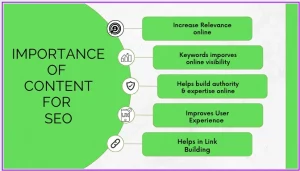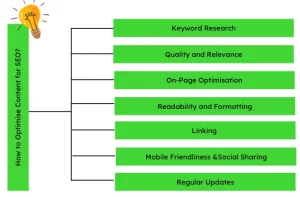Why SEO Content Is Important?
No content means no information!
You invite guests without giving them your address doesn’t make sense, right? Similarly, without content the search engine would not know which information about your website should it index. And without it, your website pages will not rank.
Running an online business without giving information to the search engine, will be a bad idea for your business.
For your website to appear in the search results, you will have to create high-quality search engine optimised content.
Read further to know why content is important for SEO.
What is Content?
In diverse sectors like media, marketing, and digital channels, content encompasses the information, materials, or creative components produced and disseminated to engage an audience. This can include a range of formats, including text, graphics, videos, audio content, and interactive media.

- Content fulfills the role of captivating, enlightening, entertaining, or instructing the intended audience. It can be discovered across websites, blogs, social media platforms, podcasts, television shows, movies, literature, and beyond.
- The development and dissemination of content are frequently motivated by specific goals, such as attracting and retaining an audience, marketing products or services, establishing brand recognition, or disseminating knowledge and ideas.
- Engaging content is typically customized to align with the target audience’s preferences, needs, and interests. It may be original and generated by individuals, institutions, or businesses, or it can be curated and compiled from various sources.
- Content can be generated for many purposes, including storytelling, news reporting, advertising, academic research, amusement, or personal self-expression.
- In the digital era, the term ‘content’ has gained substantial prominence due to the widespread use of online platforms and the ease with which individuals and organizations can produce, distribute, and consume content.
- Content production and consumption have become integral components of our everyday lives, and the demand for high-quality, compelling content persists in its growth.
Also Read: What is Copywriting?
Why content is important for SEO?
Content plays a crucial role in search engine optimisation (SEO) for several reasons:
Relevance:
Search engines aim to give users the best answers to their questions. When websites create high-quality content matching what users are looking for, it helps their web pages appear in search results. So, good content makes search engines understand and show your webpage when it’s relevant to a user’s search
Keywords:
Content helps website owners use words and phrases that people might type into search engines when looking for stuff.
When they put these words in the right places on their website, like in the content, headings, and meta tags, it tells search engines that their page is about those things. But they should use these words in a way that sounds natural and not stuff them in too much, because search engines like it when the content is good and people find it helpful.
Authority and Expertise:
Search engines like content that’s really good and comes from experts. When website owners make detailed, well-researched, and helpful content, they can show they know much about their topic.
When search engines see that the content is trustworthy and high-quality, it can make the website show up higher in search results and more people can find it
User Experience:
Search engines prioritise delivering a positive user experience. Engaging, valuable, and user-friendly content contributes to a positive experience for website visitors.
Users who find the content helpful, informative, and enjoyable are likely to spend more time on the website, explore other pages, and share the content. These user engagement signals, such as low bounce rates and high dwell time, can positively impact SEO by indicating to search engines that the content is valuable and relevant.
Link Building:
High-quality content attracts links from other websites, an essential aspect of SEO. When other websites find the content valuable, they may link to it as a reference or resource.
Inbound links from reputable websites are considered a vote of confidence and can significantly improve a website’s search rankings. Creating informative, unique, and shareable content increases the likelihood of attracting natural backlinks, enhancing the website’s overall SEO profile.
How To Create SEO Optimised Content?
Optimising content is important because it improves your website’s visibility in search engine results, increasing organic traffic and potential reach. By targeting relevant keywords, providing valuable insights, and ensuring a positive user experience, optimised content helps establish authority, attract backlinks, and drive engagement.
Ultimately, content optimization enhances your chances of reaching and connecting with your target audience, driving your business objectives.
To optimise content for SEO, consider the following strategies:

Keyword Research:
Conduct thorough keyword research to identify relevant keywords and phrases related to your content. Use keyword research tools to find popular search terms with moderate competition. Incorporate these keywords naturally throughout your content, including in headings, titles, meta tags, and within the body text.
Quality and Relevance:
Create high-quality content relevant to your target audience. Ensure that your content provides valuable and informative insights, addresses the needs of your audience, and offers a unique perspective. Search engines prioritise content that satisfies user intent and delivers a positive user experience.
On-Page Optimization:
Optimise various on-page elements to signal the relevance of your content to search engines. This includes optimising meta titles and descriptions, using descriptive URLs, employing header tags (H1, H2, etc.), and incorporating relevant keywords within the content. However, focus on providing value to readers rather than overloading the content with keywords.
Readability and Formatting:
Structure your content for easy readability. Use concise paragraphs, bullet points, and subheadings to summarise the text. Ensure your content is easy to skim and scan, as users quickly evaluate content before fully engaging. Use a readable font size and style, and include relevant visuals like images or videos to enhance user experience.
Internal and External Links:
Incorporate internal links within your content to connect related pages on your website. This helps search engines understand the structure of your site and improves user navigation. Additionally, include relevant external links to authoritative sources that support your content. Both internal and external linking provides additional context and value to your content.
Mobile-Friendliness:
Optimise your content for mobile devices, as many users access the internet through smartphones and tablets. Ensure your website and content are mobile-responsive, load quickly, and provide a seamless user experience across different devices.
Social Sharing:
Boost your content’s reach by adding social sharing buttons to your site. When people like your stuff, they’ll share it on their social media, getting more eyes on it.
Regular Updates:
Continuously update and refresh your content to ensure it remains relevant and up-to-date. Outdated content may lose its ranking over time. Regularly review and revise your content, incorporating new information or insights when necessary.
Conclusion
Content is pivotal in SEO by driving visibility, engagement, and credibility. Well-optimised content aligned with user intent and relevant keywords improves search engine rankings, increasing organic traffic and potential conversions.
Engaging, informative, and shareable content enhances user experience, encouraging extended website visits and reducing bounce rates. It also establishes authority and attracts valuable backlinks from reputable sources, boosting SEO efforts.
To leverage the power of content for your SEO success, contact us at hello[at]noboruworld.com for seo content writing , expert guidance and tailored strategies. Let us help you unlock the full potential of your content and maximise your online presence.
FAQ
What is content in the context of marketing?
In marketing, content means the stuff you create and share with your audience. It can be articles, blog posts, videos, social media updates, infographics, etc.
How does content contribute to brand awareness?
Content is a great way for businesses to make more people aware of their brand. They can show their knowledge, what they stand for, and what makes them special. By making content that people find helpful and interesting, businesses can get noticed by more people and create a good image for their brand.
Is content creation only crucial for online businesses?
No, content creation benefits all types of businesses, whether online or offline. While online businesses heavily rely on digital marketing, offline businesses can leverage content through printed materials, brochures, signage, or hosting events or workshops to share valuable information with their target audience.
How can content help with lead generation?
Content plays a significant role in lead generation by attracting and engaging potential customers. By creating informative and valuable content, businesses can capture the attention of their target audience, encourage them to provide their contact information and nurture them through the sales funnel. Ebooks, webinars, or gated content can be lead magnets to entice prospects to take action.
Does content quality affect SEO?
Yes, content quality greatly impacts SEO. Search engines value high-quality content that is relevant, informative, and provides value to users. Well-optimised content that aligns with user intent incorporates relevant keywords, and offers a positive user experience is more likely to rank higher in search engine results, improving organic visibility and attracting more organic traffic.
How often should content be updated?
The frequency of content updates depends on various factors, such as industry trends, audience preferences, and the nature of the content. It is recommended to regularly review and update content to ensure it remains accurate, relevant, and up-to-date.
Creating fresh content consistently can help attract returning visitors and signal to search engines that your website is active and provides valuable information.
How can businesses measure the success of their content?
Businesses can measure the success of their content through various metrics such as website traffic, engagement metrics (like time spent on a page, bounce rate), social shares, conversions, and backlinks.
Analysing these metrics using tools like Google Analytics or social media insights can provide insights into the effectiveness of content in achieving its goals and guide future content strategy.
Also Read – The ultimate guide to content SEO



